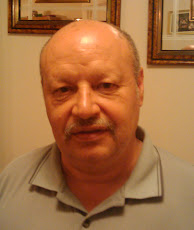Saturday, October 31, 2009
The Circle of Obstacles: When Your Spouse is Diagnosed with a Terminal Illness
We live in an era that has produced medical advancements in cardiac surgery, orthopedic surgery and transplants of various organs. Medical advancement that have saved and prolonged lives has been unable to find either treatment or cure for terminal diseases. It is difficult to accept the fact that you can go to the doctor in this modern era with your wife and be told that she has a debilitating, incurable, untreatable terminal disease.
After nearly two years and five (5) Neurologists that relied on painful tests such as four (4) spinal taps, and five (5) EMG’s. An EMG is a neurological test where needles are inserted into the patient's various limbs to test for nerve damage. Other test used was MRI’s, and muscle biopsy’s -- all to determine my wife’s illness.
Some of the diagnoses my wife was thought to possibly have, were Multiple Sclerosis, Multi Focal Motor Neuropathy, and MitroCandrial Disease. None of these named diseases are illnesses you want your wife or family member to have or experience. They are diseases that are in the motor neuron group and are incurable and difficult to treat. My wife ended up being diagnosed with Amyotrophic Lateral Sclerosis (ALS), also known as the Lou Gherig Disease. ALS is a debilitating incurable disease that affects all the voluntary muscles in the body such as the arms, legs, diaphragm and neck.
The effects of ALS disables the body from functioning, causing the patient with the inability to ambulate and they become wheel chair or bed bound. Some patients end up being fed by feeding place in the stomach, and they need assistance with breathing by machines such as a bi-pap, coughing machine and a ventilator becomes necessary... Many patients fear having to have a tracheotomy, which is a procedure where a hole is made (cut) in the breathing area of the throat and a tube is inserted to assist with the patient's breathing. When a patient has tracheotomy, it usually leads to the patient's not being able to breath. From my readings and research on the subject, the prognosis is usually 3-5 years.
Once we were given the diagnosis of ALS, our total family lives (my wife and I, her family, and our children) completed changed. We were able to get twelve (12) hours homecare service (seven (7) days per week), and access to transportation needs, as well as the use of equipment, provided through the ALS Association / New York Chapter. We started to attend the ALS support group in order to meet other care givers and patients, and build-up a support system. We wanted to learn more about the disease, its affects, and any resources or information that can be helpful. The ALS Association loaned us a power char, a transport chair and shower commode chair.
During the early months, my wife's mental status changed and she developed depression, anxiety and anger. She was no longer able to walk or stand which took away her sense of independence. She had to be carried up and down our second floor stairs, which has fifteen (15) steps and is very steep. To use the bathroom, she has to be assisted by me or the home attendant - or both. We had to undress and dress her. A few times, we didn’t make it to the bathroom on time, and when that happens, we had to undress and dress her, as well as clean up after her. Incidents like toileting, and going up and down the stairs, impeded our desire to go out.
Please provide me feedback and information on the subject. I look forward to your support of this blog, "The Work of Roque Pizarro."
Please continue to look for my articles on the subject, as well as others.
About Roque Pizarro
Professional Experience
1199SEIU BENEFIT & PENSION FUNDS (New York, NY)
2002 – 2009
Counseling Experience:
Conduct level of care assessments and referrals of members and insured dependents of the Home Care and Worker’s Union regarding mental health and substance abuse
Crisis intervention through in-person interviews and/or telephone intake
Short-term counseling services for individuals, couples and families
Responsible for the authorization of length of stay for both inpatient and outpatient substance abuse programs and mental health facilities, based on clinical criteria and benefits guideline
Monitor strong ongoing consultation with acute care facilities regarding progress of client and provide in-network referrals for aftercare plans
Function as a liaison between senior management, department heads, union representatives, health care professionals and treatment facilities
Ensure that clients are educated to the availability of public entitlements and community resources
SPECIAL CARE IMMUNOLOGY SERVICES
LUTHERAN MEDICAL CENTER (Brooklyn, NY)
1991 – 2002
Social Worker Assistant:
Bilingual Psychosocial assessment in the adult and pediatric HIV/AIDS outpatient clinic
Crisis intervention, long-term counseling to individual families, provided referrals for concrete services.
Served a diverse population and chemical dependence was often addressed
Leader of an HIV support group for men.
NEWBURGH ALCOHOL OUTPATIENT CLINIC (New York, NY)
1988 – 1991
Senior Caseworker:
Individual, group and couples therapy to clients with alcohol problems; and with dual Addiction problems
Assessed level of care needed for treatment and post-treatment care
Detailed assessment and treatment alternatives for court-mandated clients
GENERAL EXPERIENCE:
Bilingual (English/Spanish); Computer Literate; community projects with community-based organizations; writer; raised in foster care; listed with Nubian Speakers Bureau; worked with local elected officials; and received several awards and recognition for my community work and contribution.
EDUCATION
Adelphi University: Masters Degree in Social Work (2009)
Empire State College: Bachelor of Science, Labor Studies (1986)
Central Michigan University: MSA in Human Resources Administration (2002)
Certification: Certified HIV – Testing and Post Test Counseling
Certification: CTI – Understanding Domestic Violence: Essential & intersections

